The Shanghai clique,also referred to as the Shanghai gang,Jiang clique,or Jiang faction,refers to an informal group of Chinese Communist Party (CCP) officials who rose to prominence under former CCP General Secretary Jiang Zemin while he served as the party chief and mayor of Shanghai.
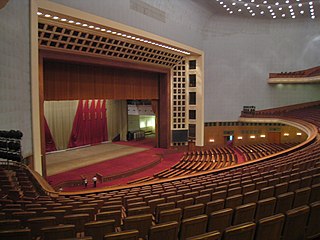
The 17th National Congress of the Chinese Communist Party was held in Beijing,China,at the Great Hall of the People from 15 to 21 October 2007. Congress marked a significant shift in the political direction of the country as CCP General Secretary Hu Jintao solidified his position of leadership. Hu's signature policy doctrine,the Scientific Development Concept,which aimed to create a "Socialist Harmonious Society" through egalitarian wealth distribution and concern for the country's less well-off,was enshrined into the Party Constitution. It was succeeded by the 18th National Congress of the Chinese Communist Party.

Zhang Qingli born 10 February 1951 in Dongping County,Shandong) is a retired politician of the People's Republic of China. He was the first-ranked vice-chairman of the 13th National Committee of the Chinese People's Political Consultative Conference (CPPCC). He was the vice-chairman and secretary-general of the 12th National Committee of the CPPCC. Previously he was the Chinese Communist Party Committee Secretary of Tibet Autonomous Region from 2006 to 2011 and of Hebei Province from 2011 to 2013. He was a member of the 16th,17th and 18th Central Committees of the Chinese Communist Party (CCP).

The Central Political and Legal Affairs Commission (CPLC),commonly referred to as Zhongyang Zhengfawei in Chinese,is the organization under the Central Committee of the Chinese Communist Party (CCP) responsible for "political and legal affairs". Based on the principles of Leninism and democratic centralism,the organization acts as the overseer and coordinator of all legal enforcement authorities,including the Ministries of State Security,Public Security and Justice,as well as the Supreme People's Court and Supreme People's Procuratorate. All provincial,municipal,county and autonomous region CCP committees have their own political and legal affairs commissions.

Wang Yang is a Chinese retired politician who served as the chairman of the National Committee of the Chinese People's Political Consultative Conference from 2018 to 2023. He was also the fourth-ranking member of the Politburo Standing Committee of the Chinese Communist Party from 2017 to 2022.
Zhang Chunxian is a Chinese politician best known for his term as the Communist Party Secretary of Xinjiang from 2010 to 2016. From 2005 to 2010 he was the Party Secretary of Hunan Province.
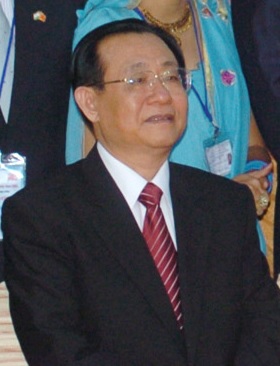
Wang Gang is a retired Chinese politician. He served in prominent leadership positions in the Chinese Communist Party (CCP) after 1999,including Director of the General Office of the CCP and Secretary of the Secretariat. He was a member of the Politburo from 2007 to 2012.
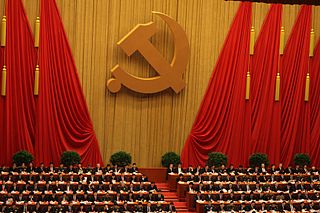
The 18th National Congress of the Chinese Communist Party was held November 8-15,2012 at the Great Hall of the People. It was preceded by the 17th National Congress of the Chinese Communist Party. Due to term limits and age restrictions,seven of the nine members of the powerful Politburo Standing Committee (PSC) retired during the Congress,including Hu Jintao,who was replaced by Xi Jinping as General Secretary of the Chinese Communist Party. The Congress elected the 18th Central Committee of the Chinese Communist Party,and saw the number of Politburo Standing Committee seats reduced from nine to seven. It was succeeded by the 19th National Congress of the Chinese Communist Party.
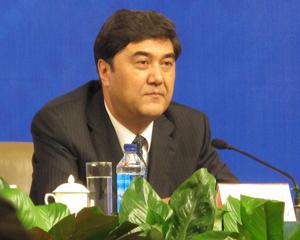
Nur Bekri is a Chinese former politician of Uyghur ethnicity,best known for his term as Chairman of the Xinjiang Uyghur Autonomous Region between 2008 and 2014. Between 2014 and 2018,he was vice-chairman of the National Development and Reform Commission and Director of the National Energy Administration,with rank equivalent of a minister. Bekri was one of the highest ranked ethnic minority officials in the Chinese government.

Saifuddin Azizi was a Chinese politician who occupied several top positions in the government of the People's Republic of China (PRC). An ethnic Uyghur,he is best known for serving as the first chairman of the Xinjiang Uyghur Autonomous Region as well as the only Communist Party committee secretary for the region who was ethnically Uyghur. Before the proclamation of the PRC in 1949,he served in the government of the breakaway Second East Turkestan Republic,as Minister of Education.
The 18th Politburo of the Chinese Communist Party (CCP),formally the Political Bureau of the 18th Central Committee of the Communist Party of China,was elected at the 1st Plenary Session of the 18th Central Committee of the CCP on 15 November 2012 in the aftermath of the 18th National Congress. This electoral term was preceded by the 17th Politburo and succeeded by the 19th. Of the 25 members,seven served in the 18th Politburo Standing Committee.

Chen Quanguo is a Chinese retired politician who was the Chinese Communist Party Committee Secretary of Tibet Autonomous Region from 2011 to 2016 and of the Xinjiang Uyghur Autonomous Region from 2016 to 2021,making him the only person to serve as the Party Secretary for both autonomous regions. Between 2017 and 2022,he was a member of the 19th Politburo of the Chinese Communist Party and was also Political Commissar of the Xinjiang Production and Construction Corps concurrently with his position as Xinjiang Party Secretary.
The organization of the Chinese Communist Party (CCP) is based upon the Leninist concept of democratic centralism.

Ismail Amat was a Chinese politician of Uyghur ethnicity who served as Chairman (Governor) of Xinjiang Uyghur Autonomous Region,State Councillor,Vice Chairman of the Standing Committee of the National People's Congress and Vice Chairman of the Chinese People's Political Consultative Conference (CPPCC).

Ma Xingrui is a Chinese politician and aerospace engineer who is the Communist Party secretary of Xinjiang. Prior to that,he had served as the Vice Minister of Industry and Information Technology,Head of the Political and Legal Affairs Commission of Guangdong,Communist Party Secretary of Shenzhen,Deputy Party Secretary of Guangdong,and Governor of Guangdong. Ma is a member of the Politburo of the Chinese Communist Party.
Zhu Hailun is a retired Chinese politician who was the current vice chairman of the Standing Committee of the People's Congress of Xinjiang Uygur Autonomous Region. Previously he served as the deputy party secretary of the Xinjiang Uyghur Autonomous Region. Between 2009 and 2016,Zhu was the party chief of Urumqi,the capital of the Xinjiang region.
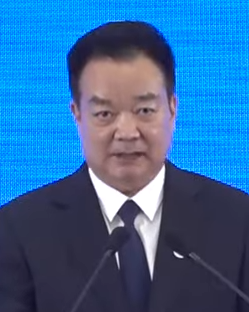
Wang Junzheng is a Chinese politician,serving Communist Party Secretary of Tibet since 18 October 2021. He was head of the Political and Legal Affairs Commission of Xinjiang. Between 2016 and 2019,he was the Chinese Communist Party Committee Secretary of Changchun. Prior to his position in Changchun,he served in a variety of posts,as vice-governor of Hubei,the Party Secretary of Xiangyang,and the mayor and party chief of Lijiang.

The 19th National Congress of the Chinese Communist Party was held at the Great Hall of the People,Beijing,between 18 and 24 October 2017. 2,280 delegates represented the party's estimated 89 million members. Preparations for the 19th National Congress began in 2016 and ended with a plenary session of the Central Committee a few days prior to the Congress. In 2016,local and provincial party organizations began electing delegates to the congress as well as receiving and amending party documents. It was succeeded by the 20th National Congress of the Chinese Communist Party.
In May 2014,the Government of the People's Republic of China (PRC) launched the "Strike Hard Campaign against Violent Terrorism" in the far west province of Xinjiang. It is an aspect of the Xinjiang conflict,the ongoing struggle by the Chinese Communist Party (CCP) and the Chinese government to manage the ethnically diverse and tumultuous province. According to critics,the CCP and the Chinese government have used the global "war on terrorism" of the 2000s to frame separatist and ethnic unrest as acts of Islamist terrorism to legitimize its counter-insurgency policies in Xinjiang. Chinese officials have maintained that the campaign is essential for national security purposes.

The Xinjiang Uygur Autonomous Regional Committee of the Chinese Communist Party,officially the Xinjiang Uygur Autonomous Regional Committee of the Communist Party of China,is the regional committee of the Chinese Communist Party (CCP) in the Xinjiang Uygur Autonomous Region. The committee secretary is the highest ranking post in the region,and also ex officio leads the Xinjiang Production and Construction Corps (XPCC). The current secretary is Ma Xingrui,a member of the CCP Politburo,who succeeded Chen Quanguo on 25 December 2021.












